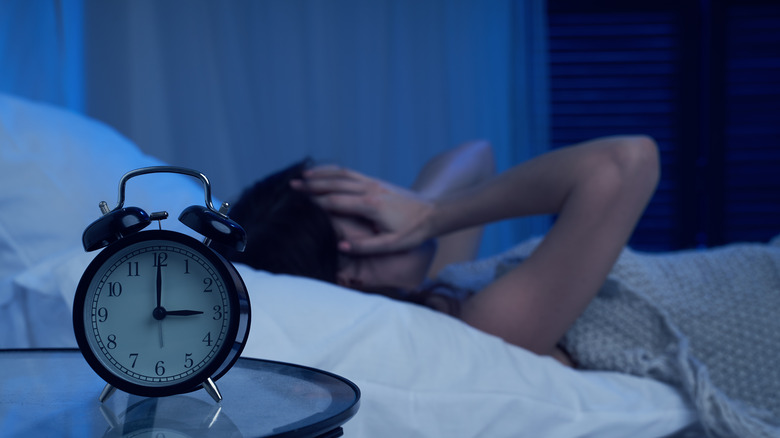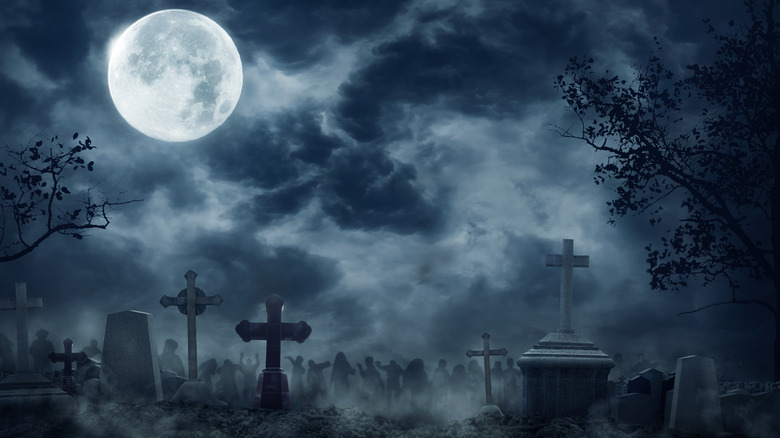The Word Nightmare Once Had An Even Scarier Meaning
The world of dreams is a truly strange place. Some of us claim never to dream at all, or at least never to remember them. Others can recount vivid dreams that took them to the most unexplained and bizarre places. Riding through a field of candy canes on the back of a multi-colored horse/gigantic beetle hybrid that has standard lamps for legs? That's not the sort of experience you get to have every day, but in dreams, anything is possible.
Strange and ridiculous dreams can be quite entertaining. If nothing else, they give you an interesting story to tell friends and family the next day. Nightmares, however, can be truly traumatic. From horror movie-esque scenes to our greatest fears being realized, nightmares seem to delight in devastating our minds when we're at our most vulnerable. The even more frightening thing is the origin of the word "nightmare" itself. It's steeped in the tale of a creature you may indeed meet in a ghastly dream.
Nightmare, you might think, is just a word for a scary dream. It certainly is often used in that context, but there's an important distinction to be drawn. As Sleep Foundation reports, true nightmares awaken the unfortunate person experiencing them from their fitful slumber. Merely distressing dreams, it seems, do not.
A visit from a mare in the night could be fatal
As Merriam-Webster reports, nightmare has a variety of definitions. It is often used literally (defined as "a frightening dream that usually awakens the sleeper"), but is just as commonly employed in a figurative sense: anything from a traffic jam to a hangnail can be considered a "nightmare" of an experience. Merriam-Webster's other definition of the word, however, is by far the most unsettling: "an evil spirit formerly thought to oppress people during sleep." It seems that there used to be a belief in a "mare" of the night, and she was an even less welcome nighttime visitor than Freddy Krueger.
In "Heimskringla: History of the Kings of Norway," Snorri Sturluson describes the supposed grim fate of King Vanlandi. The king attracted the wrath of his wife, Drifa, who called upon a witch named Huld to fix his wagon. Or, rather, to have him crushed to death by a nightmare.The author relates, "he had hardly gone to sleep when he called out, saying that a nightmare rode him. His men went to him ... when they took hold of his head the nightmare trod on his legs so they nearly broke; and when they seized his feet it pressed down on his head so that he died."
Nightmares remain terrifying experiences
The Online Etymology Dictionary states that the word "nightmare," in this scary context, first appeared during the 14th century. Around 250 years later, its meaning had reportedly changed to indicate not the malevolent spirit or creature itself, but the awful suffocating feeling associated with its nighttime attacks. Seeing characters in TV shows and movies awakening from nightmares in dramatic fashion today, it's clear that we can still at least partially relate with this feeling.
Britannica, in fact, states that such feelings are commonly experienced by those awakening from harrowing nightmares. These people may not be having their bodies crushed by malevolent spirits, but the sentiment is the same. Healthline reports that nightmares (harrowing dreams, not the spirits) can have a range of different causes, from sickness to anxiety, which can make them difficult to predict. The outlet doesn't mention learning about the true origins of the word "nightmare" being a factor, but we can probably take that as a given.


